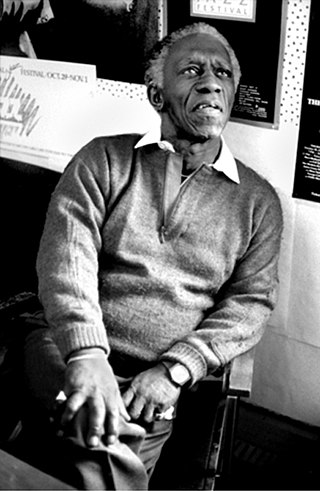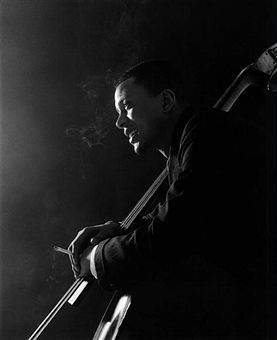Related Research Articles

Hard bop is a subgenre of jazz that is an extension of bebop music. Journalists and record companies began using the term in the mid-1950s to describe a new current within jazz that incorporated influences from rhythm and blues, gospel music, and blues, especially in saxophone and piano playing.

Horace Ward Martin Tavares Silver was an American jazz pianist, composer, and arranger, particularly in the hard bop style that he helped pioneer in the 1950s.

Kai Chresten Winding was a Danish-born American trombonist and jazz composer. He is known for his collaborations with fellow trombonist J. J. Johnson. His version of "More", the theme from the movie Mondo Cane, reached in 1963 number 8 in the Billboard Hot 100 and remained his only entry here.

Arthur Blakey was an American jazz drummer and bandleader. He was also known as Abdullah Ibn Buhaina after he converted to Islam for a short time in the late 1940s.

Soul jazz or funky jazz is a subgenre of jazz that incorporates strong influences from hard bop, blues, soul, gospel and rhythm and blues. Soul jazz is often characterized by organ trios featuring the Hammond organ and small combos including tenor saxophone, electric guitar, drums, piano, vocals, pipe organ and electric organ. Its origins were in the 1950s and early 1960s, with its heyday with popular audiences preceding the rise of jazz fusion in the late 1960s and 1970s. Prominent names in fusion ranged from bop pianists including Bobby Timmons and Junior Mance to a wide range of organists, saxophonists, pianists, drummers and electric guitarists including Jack McDuff, Eddie "Lockjaw" Davis, and Grant Green.

Henry "Hank" Mobley was an American hard bop and soul jazz tenor saxophonist and composer. Mobley was described by Leonard Feather as the "middleweight champion of the tenor saxophone", a metaphor used to describe his tone, that was neither as aggressive as John Coltrane nor as mellow as Lester Young, and his style that was laid-back, subtle and melodic, especially in contrast with players like Coltrane and Sonny Rollins. The critic Stacia Proefrock claimed him "one of the most underrated musicians of the bop era." Mobley's compositions included "Double Exposure," "Soul Station", and "Dig Dis," among others.

Walter Bishop Jr. was an American jazz pianist.

Walter Davis Jr. was an American bebop and hard bop pianist.

Douglas Watkins was an American jazz double bassist. He was best known for being an accompanist to various hard bop artists in the Detroit area, including Donald Byrd and Jackie McLean.

At the Cafe Bohemia, Vol. 1 is a live album by the Jazz Messengers for Blue Note Records. It featured the original incarnation of the Jazz Messengers, Art Blakey's career-spanning band, and is the first of two volumes recorded on November 23, 1955, at Café Bohemia, a famous night club in Greenwich Village in New York.

At the Cafe Bohemia, Vol. 2 is a 1956 live album release by the Jazz Messengers. It was first released by Blue Note Records. This record featured the original incarnation of The Jazz Messengers, one of Art Blakey's most endearing bands, and was the second of two volumes recorded at Café Bohemia, a famous night club in Greenwich Village in New York, New York on November 23, 1955.

Horace Silver and the Jazz Messengers is a 1956 repackage of 1955 10” LPs by jazz pianist Horace Silver with drummer Art Blakey and featuring Hank Mobley on tenor saxophone, Kenny Dorham on trumpet, and Doug Watkins on bass. By the time this repackage was released, this quintet had named themselves the Jazz Messengers, and the band name on the label reflected that. These recordings helped establish the hard bop style. Scott Yanow on Allmusic describes it as "a true classic". Originally released as an LP, the album has subsequently been reissued on CD several times.

Hank Mobley Quintet is an album by jazz saxophonist Hank Mobley released on the Blue Note label in 1957 as BLP 1550. It was recorded on March 8, 1957 and features Mobley, trumpeter Art Farmer, bassist Doug Watkins, pianist Horace Silver, and drummer Art Blakey. These musicians were the first lineup of The Jazz Messengers, with Farmer instead of Kenny Dorham. The album was remastered in 2008 by Rudy Van Gelder and issued on CD.
This is the discography for American jazz musician Hank Mobley.

Afro-Cuban is an album by American jazz trumpeter Kenny Dorham. The first release of the album dates back to 1955 on 10" Vinyl, featuring only four tracks and having a different cover artwork. Some time later, Blue Note decided to add three tracks and issue a more complete LP toward the end of May 1957. After publishing a 2003 RVG edition which featured two additional pieces and a different track listing, Blue Note remastered and recompiled Afro-Cuban in 2007, restoring the original track order.

The Jazz Messengers were a jazz combo that existed for over thirty-five years beginning in the early 1950s as a collective, and ending when long-time leader and founding drummer Art Blakey died in 1990. Blakey led or co-led the group from the outset. "Art Blakey" and "Jazz Messengers" became synonymous over the years, though Blakey did lead non-Messenger recording sessions and played as a sideman for other groups throughout his career.
"Yes sir, I'm gonna to stay with the youngsters. When these get too old, I'm gonna get some younger ones. Keeps the mind active."
"Doodlin'" is a composition by Horace Silver. The original version, by Silver's quintet, was recorded on November 13, 1954. It was soon covered by other musicians, including with lyrics added by Jon Hendricks. It has become a jazz standard.

Trombone Panorama is an album by American jazz trombonist Kai Winding featuring performances recorded in late 1956 and early 1957 for the Columbia label.
References
- ↑ "Horace Silver / Horace Silver & the Jazz Messengers – Horace Silver and the Jazz Messengers". AllMusic. Retrieved September 13, 2015.
- ↑ "Horace Silver – Obituary". (June 19, 2014). The Daily Telegraph.
- 1 2 Rosenthal, David H. (1993) Hard Bop: Jazz and Black Music, 1955–1965. Oxford University Press. p. 38.
- 1 2 Silver, Horace (2007) Let's Get to the Nitty Gritty – The Autobiography of Horace Silver. University of California Press.
- ↑ Carr, Ian; Fairweather, Digby; Priestley, Brian (2004) "The Rough Guide to Jazz" (3rd ed.). Rough Guides. p. 730.
- ↑ Cook, Richard (2004) Blue Note Records – The Biography. Justin, Charles & Co. p. 74.
- ↑ Shoemaker, Bill (November 1999) "Horace Silver – The Horace Silver Retrospective". JazzTimes.
- ↑ Gioia, Ted (2011) The History of Jazz. Oxford University Press. p. 288.
- ↑ Leggett, Steve "Jimmy Smith – The Incredible Jimmy Smith at Club Baby Grand, Vol. 1". AllMusic. Retrieved September 13, 2015.
- ↑ "Kai Winding – Trombone Panorama". AllMusic. Retrieved September 13, 2015.
- ↑ "Sunday Afternoon with Babs Gonzales at Small's Paradise – Babs Gonzales". Fresh Sound Records. Retrieved September 13, 2015.
- ↑ McDonough, John (September 2014) "Horace Silver". Down Beat p. 49.